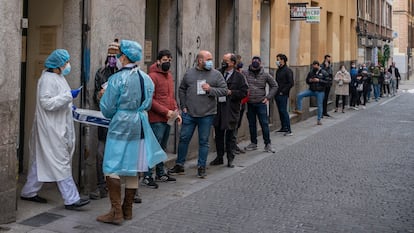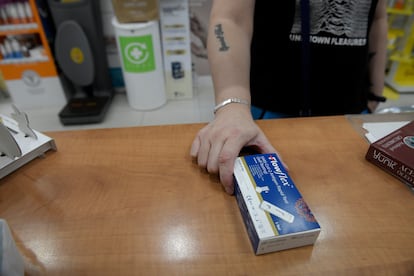As coronavirus cases keep rising in Spain, regions warn of healthcare staffing shortages
Workers are being kept home after getting infected, adding to the strain on centers. The Valencia region has asked pharmacies to cooperate by reporting positives

Coronavirus cases in Spain continued to rise on Wednesday, when the Health Ministry reported 137,180 new infections and added 148 deaths to the official count as the country grapples with a sixth wave that is straining the healthcare system due to the high transmission rate of the omicron strain.
Infections continued to rise across the country except in the regions of Andalusia and La Rioja, which reported a downward trend. But the 14-day cumulative incidence for Spain as a whole rose by 140 points to reach 2,574 cases per 100,000 people, an extremely high value for one of the transmission indicators used by the government’s traffic-light system to assess risk scenarios.
This system also looks at hospitalization rates to determine risk, and until recently these had remained lower than at other pandemic peaks, reflecting the fact that the omicron variant appears to be more transmissible but to cause less severe illness than other strains, possibly due to high vaccination rates. The sheer number of infections, however, is leading to higher admission figures in recent days.
Strained services
This new wave of the coronavirus, fueled by a variant that has already been described as the fastest-spreading virus in history, is starting to strain not just Spain’s healthcare system but other essential services as well, including the police, fire fighting and public transit, where many workers are staying home due to infections or close contact with an infected person.
In the southern region of Andalusia, a lack of workers has created added pressure on hospitals as well as primary healthcare centers. “There’s a huge amount of infected people and we figure there’s 7,000 nurses who are positive right now, so around 30% of the 20,000 on contracts,” said José Sánchez, the secretary general for the nursing union Satse.
Added to this is the fact that the Andalusian government recently let go of 8,000 out of the 20,000 healthcare workers who had been hired as reinforcements during the pandemic. “It’s a management problem: if you fire 8,000 people, you don’t plan for the holiday season or the Covid surge, and also don’t introduce restrictions, it’s a perfect mix for the bubble to burst,” said Antonio Macías, of the UGT union.
In Catalonia, there are 2,500 healthcare workers on sick leave, more than twice the number during the fifth wave, according to the Catalan department of health. In Madrid, a lack of updated figures makes it difficult to know what the current situation is, but out of a total of 24,213 workers in the public healthcare services, there were 1,377 on sick leave due to Covid according to data released on December 27, representing around 5% of the total.
“The omicron peak has overwhelmed us; some family doctors have had to see children coming from the emergency room because there were no pediatricians on some afternoons,” said Susana Calvo, a family doctor at a health center in the Madrid district of Carabanchel Alto. She herself is positive and is staying home for a few days more.
In the Basque Country, Juan Carlos Blázquez, president of the Medical Union of Euskadi, said they have a “very relevant” problem with the number of doctors on sick leave. And the Valencia region is experiencing shortages among nurses, according to Eva Plana of the UGT union, who said it is urgent to hire new permanent personnel. The Valencia health department recently announced it will be hiring 6,000 new healthcare workers in 2022.
Antigen tests in Valencia

The leader of the Valencia region, Ximo Puig, on Wednesday announced a deal to facilitate the reporting of positive cases by pharmacies administering antigen tests on customers who request them. The move will go into effect next week and is similar to what other Spanish regions such as Catalonia have already done in a effort to get a better picture of the real extent of coronavirus transmission.
“We need everyone’s cooperation,” said Puig, who thanked pharmacies for their help. The initiative will be voluntary and seeks to relieve pressure on the primary healthcare system, which has been flooded with requests for tests.
When a test is administered at a pharmacy in the Valencia region and the result is positive, the establishment will notify the health authorities. The pharmacy may also take down the individual’s personal information but only if the latter agrees to it.
Antigen tests have been for sale at pharmacies in Spain since the summer, and sales skyrocketed ahead of the Christmas holidays.
Tu suscripción se está usando en otro dispositivo
¿Quieres añadir otro usuario a tu suscripción?
Si continúas leyendo en este dispositivo, no se podrá leer en el otro.
FlechaTu suscripción se está usando en otro dispositivo y solo puedes acceder a EL PAÍS desde un dispositivo a la vez.
Si quieres compartir tu cuenta, cambia tu suscripción a la modalidad Premium, así podrás añadir otro usuario. Cada uno accederá con su propia cuenta de email, lo que os permitirá personalizar vuestra experiencia en EL PAÍS.
¿Tienes una suscripción de empresa? Accede aquí para contratar más cuentas.
En el caso de no saber quién está usando tu cuenta, te recomendamos cambiar tu contraseña aquí.
Si decides continuar compartiendo tu cuenta, este mensaje se mostrará en tu dispositivo y en el de la otra persona que está usando tu cuenta de forma indefinida, afectando a tu experiencia de lectura. Puedes consultar aquí los términos y condiciones de la suscripción digital.








































